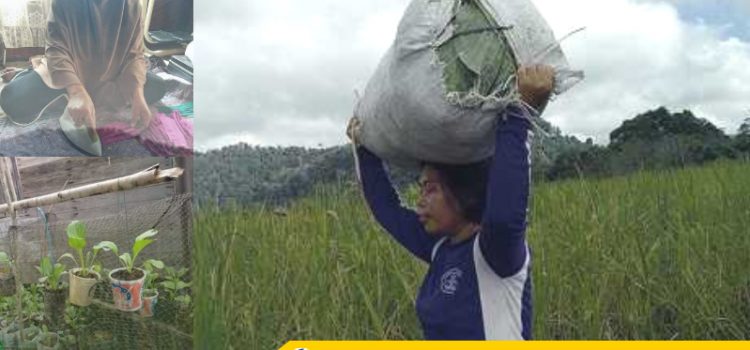
Gemawan has been long working to manifest food sovereignty and livelihood, ensure that food supplies are always available – at least at the household level, with various programs, such as protection and rights of land and forests, and strengthen the capacity of farmers. Moreover, Gemawan has made an effort to build the strength and empowerment of women on playing roles in society and encourage transparency and accountability in governance, especially those related to the lower-class people.
The three big issues – social work, gender, and environmental justice – have been done since the last 15 years of Gemawan’s existence. All of these activities have created a very positive impact in building the resilience of Gemawan assisted groups, especially during the Covid-19 pandemic. By maximizing the energy of Work From Home and utilizing information technology that can be accessed by the group members, Gemawan mobilizes the group-based power cooperating with Gemawan to deal with the pandemic.
In times of crisis, such as the Covid-19 pandemic, the availability of food stocks is the main priority. This is also done by the members of women’s groups and farmers in the Gemawan work area. Fortunately, despite the pandemic, rice harvesting, vegetables, spices and fruits can still be done to meet the needs of families and also communities. Some can be sold and shared with the fellow members, and even distributed to the community in the village. This shows that the protection of farmers’ means of production (land, seeds and knowledge) and farmers’ access to agricultural facilities must be a concern. In fact, the pandemic proves that the group whose economy is quite stable is the farmer of food crops.
Women’s groups that are members of the North Coast Women’s Union (SERUMPUN) in Sambas Regency and Singkawang City are the examples of resilient women’s groups. Encouraged by the awareness to play a role in protecting families and communities, they took the initiative to make personal protective equipment (PPE), such as cloth face masks and produce simple herbal medicine made from medicinal plants around their home. When surgical masks were difficult to obtain and prioritized for medical personnel, the women’s group of the SERUMPUN cooperated with villages and other parties to produce face masks distributed to the entire community. This initiative proves that women are very important actors in village development.
The women who are members of SERUMPUN also built solidarity to help group members who cannot sell directly on the market or at their own places due to the Covid-19 pandemic. The Information of fishermen’s wives products – such as salted fish, “cencalok” (fermented shrimp), shrimp paste, crackers and amplang (fish crackers) – has been marketed online. They also have raised money to help friends who have lost their incomes as well as encouraged and provided solutions so that those affected can become empowered again. This activity has been going on for two months and – once again – they have succeeded in helping the women members of the group to keep earning incomes while remaining optimistic. This is small but tangible evidence of the big term which is trending in the social movement “People Help the People”.
In addition to working with the community, Gemawan also spreads information and flyers online on Gemawan’s social media and WA Groups. This is done to campaign Covid-19 protocols for personal, family and community safety, such as campaigning for wearing face masks when going outdoors, avoiding crowds wherever possible, preparing water and soap in front of the house, washing hands frequently, always thinking positively and getting closer to the Almighty. Because maintaining mental and spiritual health (faith) at this time is no less important than maintaining physical immunity.
The Indonesian government issued policies on various types of social assistance for the poor and the business world. With various types (such as Special Social Assistance, Increasing the number of PKH or Family Hope Program recipients, Electricity Subsidies, BLT or Direct Social Assistance, Labor Intensive Programs, Pre-Employment Cards, Basic Food Cards and KIP or Indonesia Smart Cards), the assistance packages are numerous. In order to ensure that the distribution of the aids is right on target and people who have not been recorded but who meet the category of groups affected by the Covid-19 pandemic can still receive assistance, Gemawan invites all parties to actively monitor and ensure accountability and transparency of the implementation can be maintained. The women are also active in monitoring and reporting the names that have not been recorded to the RT or Community Association in order to get the government’s further service. This campaign is promoted through flyers on Gemawan’s social media.
One Health Approach is WHO‘s invitation to look at the situation of the Covid-19 Pandemic as an approach that sees human health is closely related to the health of animals, plants and the environment we live in together. As information states that this corona virus comes from bats, meaning that when the environment and nature are damaged, other habitats will also lose their living space and penetrate the human environment. Therefore, mutually protecting the environment and nature where we live together becomes important. Humans must be able to live a better life and make this moment as a reflection moment about humanity, justice and the sustainable living on earth. For us, we are more convinced that the works to build social, gender and environmental justice that we have been doing so far are true to build a better civilization and a better earth.
Laili Khairnur,
Director of Gemawan
